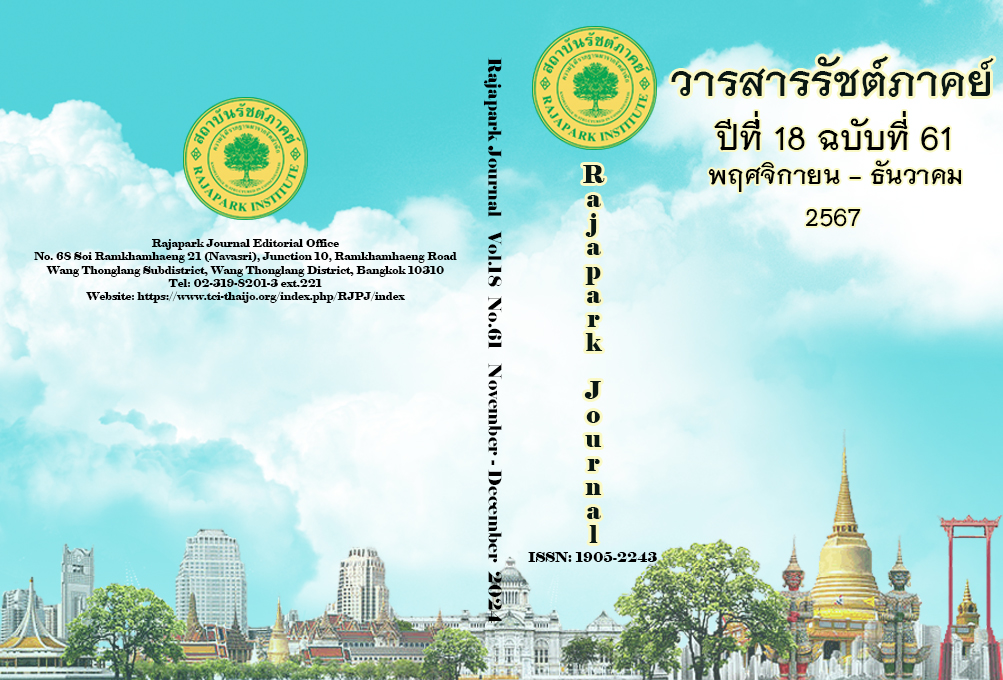Legal Problems Relating to the Offense of Insulting Other Person in His Presence: Study on the Insult via Phone
Main Article Content
Abstract
This academic article aims to examine the legal issues related to the crime of defamation, highlighting the importance of enforcing the law. It addresses the challenges surrounding defamation, particularly in cases in Thailand where there are no penalties for offenders who engage in harmful communication, such as using abusive language over the telephone. This article examines the background, theories, and Supreme Court decisions related to telephone contempt. It discusses the measures, methods, and conditions surrounding the law on this topic, while also comparing the principles of criminal law related to contempt. Additionally, it explores several interesting cases that have been brought to court in Thailand. The study highlights that modern communication enables people to connect quickly and easily, effectively shrinking the world. It brings distant matters closer, allows access to information, and provides a platform for self-expression. However, the ease of communication means that people do not always have to interact face-to-face. This type of communication often takes the form of conversations where each party can be in different locations, whether they are in different districts, provinces, or even countries—showcasing one of the advantages of using a telephone. In the past, however, users have sometimes misused the telephone, employing it for inappropriate purposes that can affect others negatively. This misuse has led to annoyance, trouble, and even significant harm. Instances include using the telephone for criminal activities or to verbally insult others. The study found that Section 393 of the Criminal Code, including the Supreme Court's judgments in Thailand, lacks consistent provisions regarding the offense of defamation, particularly when insults are made over the phone. This inconsistency raises concerns about whether such actions are clearly defined as offenses or subject to specific penalties. Based on an analysis of principles, theories, and court rulings, it is recommended that Thailand revise and amend Section 393 of the Criminal Code. This revision aims to promote justice in society, ensure fairness for victims who deserve state protection, and guarantee the delivery of justice for all citizens.
Article Details

This work is licensed under a Creative Commons Attribution-NonCommercial-NoDerivatives 4.0 International License.
Views and opinions appearing in the Journal it is the responsibility of the author of the article, and does not constitute the view and responsibility of the editorial team.
References
Boonlert, S. et al. (2014). Defamation. Prosecutor Journal, 86, 189-192. https://www3.ago.go.th/statebook/e86/index.html#p=7
Bunpho, B. (2013). Remarks on liability of the offenses of defamation: Case study of social network. Journal of Politics, Administration and Law, 5(3), 183-211. https://ojs.lib.buu.ac.th/index.php/law/article/view/3010
Karaket, P. (2021) Legal problems regarding the offense of defamation on the internet. Faculty of Law, Ramkhamhaeng University. http://www.lawgrad.ru.ac.th/AbstractsFile/6024011268/15740493560b7d2f66f43fa1e32202a19aa67419e4_abstract.pdf
Meenakanit, T. (2020). Explanation of criminal law, general section (21st ed.). Winyuchon.
Polkul, N. (2017). The authority of the prosecutor’s staff. Nititham.
Srisung, E. (2022). Is it criminal offense to insult each other over the phone or Line?. https://srisunglaw.com/phoneorline/
Tingsaphat, C. (2010). Criminal Law, Part 2: Section 2, and Part 3. (7th ed.). The Thai Bar Under the Royal Patronage.


